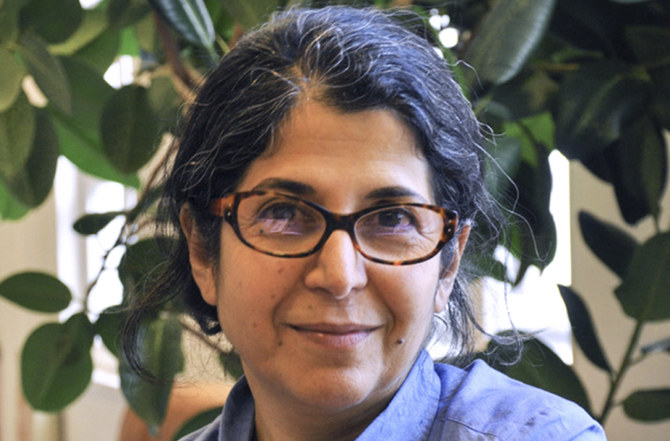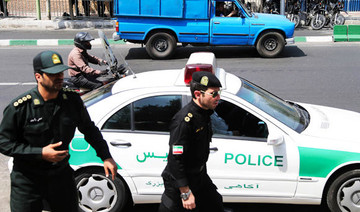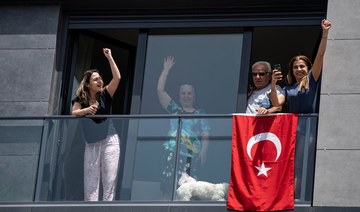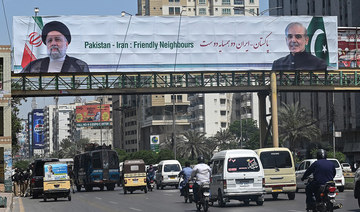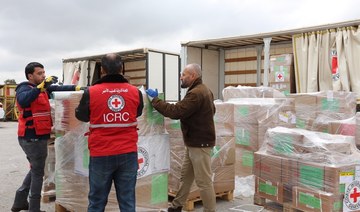PARIS: Friends and supporters of French-Iranian anthropologist and academic Fariba Adelkhah, serving a six-year jail sentence in Iran, say that her ordeal could drag on for some time, raising fears for her health and well-being.
Adelkhah has already been held in Evin Prison, Tehran, for almost a year. She and a fellow researcher at France's Center for International Research, Frenchman Roland Marchal, were arrested in Iran in June last year. Marchal was released on March 20 in exchange for the release of an Iranian engineer detained in France over allegations that he violated US sanctions.
Adelkhah initially faced a charge of espionage, which carries a death sentence, but this was dropped on Jan. 6. According to her lawyer, Saeid Dehghan, she was sentenced on May 16 to five years for gathering and conspiring against Iran’s national security, plus one year for anti-Iranian propaganda. The terms are expected to run concurrently, he added.
French Foreign Minister Jean-Yves Le Drian condemned the sentencing and urged the Iranians to immediately release Adelkhah, who holds dual Iranian and French nationalities.
“The conviction is not based on any serious or recognized fact and is therefore of a political nature,” he said.
Bernard Hourcade, the director emeritus of France’s National Council for Scientific Research and an expert on Iran, said: “Iran set Roland Marchal free and was rewarded with the release of an Iranian arms dealer held in France. As for Fariba, there are no more exchanges that need to be made, so her case could drag on.
“I think they want to get rid of her and they need to find an excuse to return her to France because she is no longer useful to them. Her presence is a problem because it creates tension between France and Iran. Her imprisonment is not important enough to be used as a means of applying pressure.”
There are a number of possible motives for Adelkhah’s detention beyond the possibility of prisoner exchange, Hourcade added. For example, he said, the Islamic Revolutionary Guard Corps (IRGC) want to send a message that research on Iran is prohibited.
“They don’t want journalists and researchers working freely in Iran,” he said. “They don’t want foreign researchers to see what’s going on in Iran.
“Fariba and other dual nationals were able to visit Iran but they were given a clear message: you cannot work anywhere.”
Adelkhah’s supporters in France are concerned about the health of the 61-year-old, given that Iran has been badly hit by the COVID-19 pandemic.
“Iran has shot itself in the foot because Adelkhah is one of the greatest researchers and her work is authoritative,” said Jean Francois Bayart, a professor at the Graduate Institute (IHEID) in Geneva, coordinator of the Fariba Adelkhah Support Group, and Adelkhah’s former boss at CERI.
“Objectively, silencing that voice is not a very smart move on Iran’s part.”
He said he has known and worked with Adelkhah for 30 years, “and if there is anything that characterizes her, it is her absolute intellectual independence.”
He added: “I know Fariba very well on the political level too; she is fiercely independent and takes orders from nobody. Her writings are strictly scientific and anthropological and that is why we cannot call her a political prisoner. She has never engaged in politics in Iran, or in related political topics, but her trial is strictly political and so are the grotesque accusations.”
He said that her arrest might have been an attempt by some within the Revolutionary Guards to embarrass others within the group as a result of infighting.
“Another theory is that those who imprisoned (her) want to embarrass President Rouhani because they sensed that he was very embarrassed during his talks with Macron,” said Bayart.
He also said there might also be hopes in Iran that Adelkhah could yet be used as a bargaining chip to secure the release of more Iranians held overseas.
After his release, the engineer exchanged for Marchal gave an interview to an Iranian TV channel, Bayart said, in which he stated he was a member of the IRGC and had been released thanks to the Corps.
“During Roland Marchal’s interrogation, the Iranians did not hide the fact that they wanted to trade the engineer for him,” Bayart added.



